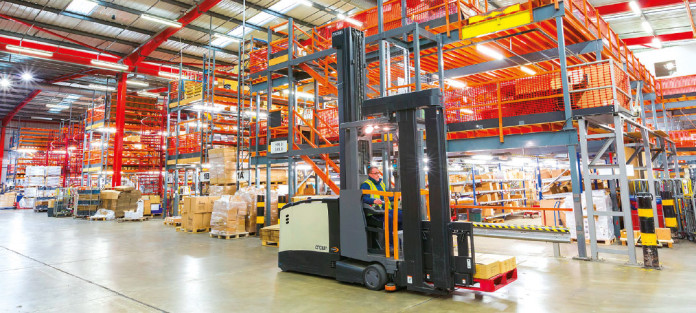Ed Chadwick weighs up the chances of new nationwide low-frills FMCG operator RetailerSaver.
Wholesalers have a new competitor in their midst – and it has ambitious plans to take a share of the FMCG market. It doesn’t operate a fascia group, owns no vehicles or warehouse space, and will not physically handle products.
Instead, RetailerSaver.com says it will pass on huge savings from its no frills operation to retailers to give them up to 60% profit on return on big brands. Logistics will be handled by Menzies Distribution and products will come from suppliers trading in surplus stock and discount channels.
The company has quickly established a presence since it relaunched in November, with 4,000 independent retailers signed up. But the claim of chief executive Jamie Burke that his company will offer “a genuine alternative to the big three delivered” wholesalers is wishful thinking, says John Kinney, retail director at the Today’s Group. He questions the type of retailers likely to be wooed by the promise of enhanced margins.
RetailerSaver says that it expects much of its custom to come from “small format discounters” and unaffiliated independents. Kinney says: “That’s a shrinking part of the market and there are plenty of stores within the sector which won’t necessarily have the cashflow to order in the quantities necessary to make worthwhile savings.”
Another consideration is the limited range RetailerSaver can offer. It says 100 SKUs will be available in a rolling programme of deals but it focuses on alcohol, confectionery and soft drinks – even a CTN with the tightest range will need to get much of its order from elsewhere.
Developments in convenience retailing in the past year have tended towards fresh and the development of strong promotional campaigns. Kinney argues much of what RetailerSaver promises is out of step with progress being made by wholesalers in partnership with good retailers.
“It cuts across everything we are trying to get retailers to buy into on promotional campaigns – don’t repeat products and have a good spread across categories,” he says. “Promotions need to be consumer-led and have a good mix of value and premium. Good retailing isn’t about chasing round and making a small saving.”
In difficult times, it’s fair to assume that retailers might be tempted to bolster profits. But there remains plenty for them to consider.
One is the £850 spend needed to qualify for free delivery and upfront payment terms, compared to the credit offered by many of RetailerSaver’s established competitors.
Glasgow retailer Des Barr says that although he is impressed with the prices, many retailers simply can’t afford to spend time dealing with an additional wholesaler mostly interested in large volumes.
“If I wanted to take a pallet of Coke, I’ve got to find someone to split the volume with,” he said.
“I’m paying upfront for a volume which will take a month to sell through. There’s a profit to be made but companies like this shouldn’t underestimate our loyalty to our existing wholesalers.”









Hi Ed. To answer the challenges to the model.
Firstly whilst our target market is unaffiliated we are increasingly finding affiliated retailers dissatisfied with their current suppliers coming on board. The likes of Costcutters are haemorrhaging retailers at the moment. So whilst the indie market may be shrinking disloyalty is increasing and its here we hope to grow market share as we transition from what is a deliberately focused offer into a fuller solution. Don’t run before you can walk.
We offer 350, not 100 fast moving lines, and are carefully expanding that every quarter based on retailer feedback. However we don’t look to entirely replace the local cash & carry but steal the ‘volume skus’ where we are already 15% (up to 35%) cheaper than Booker, Bestway and P&H on everyday prices. And we have only just begun.
If you look on the website Specials Section we offer bundles every week from £150 to £250 which include a mix of items so do use promotional activity to support retailers beyond like-for-like single SKU.
Free delivery is £850 but our minimum order is only £250 and delivery just 50p per case on items where you are saving up to 35% on. So we are cheaper AND we deliver unlike many Todays wholesalers with nationwide delivery. This is why we are cleaning up in hard to reach ‘sheep & gulls’ territory. So the math does add up.
But ultimately the proof is in the pudding. Which is do retailers use us?
And the answer is a resounding yes. To be acknowledged by Todays already to me signals they see us as a threat and rightly so…
We have none of their wholesalers fixed overheads or inefficient behaviours. We don’f offer credit, hold stock speculatively in expensive retail spaces, or the head count to physically staff. them
We are deliberately designed not to serve retailers that are unable to buy strategically and that live more hand-to-mouth because this is the part of the indie market that is shrinking… I would argue these are the retailers Todays are heavily reliant on. One might say keeping on a life support.
We are here to help indies stay independent but gain from our unintrusive strategic support. We respect retailers and don’t belittle them into thinking they need to be part of a restrictive fascia to survive. Hence the tag line ‘Delivering Independence’.
Equally we know indies and manufacturers alike are grossly dissatisfied with the traditional wholesale channel for its ineffectiveness and inefficiencies as well as poor adoption of digital practices. I’ve personally helped companies like Tesco, Honda and Nike develop their global digital strategies and now I am using this experience to help the small indie retailer.
But for me the real validation as to why I know Todays will struggle to compete with us in the long-term is we are buying so well we actually wholesale to their wholesalers…. go figure.
Any questions you can tweet me at @jamie247